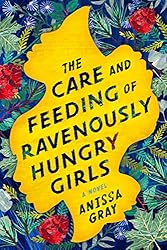Care and Feeding of Ravenously Hungry Girls (Gray)
| Article Index | Summary | Author Bio | Book Reviews | Discussion Questions | Full Version |
|---|
The Care and Feeding of Ravenously Hungry Girls
Anissa Gray, 2019
Penguin Publishing
304 pp.
ISBN-13: 9781984802439
Summary
The Butler family has had their share of trials—as sisters Althea, Viola, and Lillian can attest—but nothing prepared them for the literal trial that will upend their lives.
Althea, the eldest sister and substitute matriarch, is a force to be reckoned with and her younger sisters have alternately appreciated and chafed at her strong will.
They are as stunned as the rest of the small community when she and her husband, Proctor, are arrested, and in a heartbeat the family goes from one of the most respected in town to utter disgrace.
The worst part is, not even her sisters are sure exactly what happened.
As Althea awaits her fate, Lillian and Viola must come together in the house they grew up in to care for their sister’s teenage daughters. What unfolds is a stunning portrait of the heart and core of an American family in a story that is as page-turning as it is important. (From the publisher.)
Author Bio
• Birth—N/A
• Where—St. Joseph, Michigan, USA
• Education—B.A., Western Michigan University; M.A., New York University
• Currently—Atlanta, Georgia
Anissa Gray is a journalist of some 20 years, as well as a novelist. Born in St. Joseph, Michigan, she received her B.A. from Western Michigan University and went on to earn an M.A. in English and American literature from New York University.
Following her graduate work, Gray remained in New York, taking a job as a print reporter for Reuters, for whom she covered business news and international finance. Then she headed for Atlanta to work in broadcast journalism for CNN. She has served as a writer, producer and editor, eventually becoming Senior Editor at CNN Worldwide. Gray has been a contributor to award winning stories that have won both an Emmy and a DuPont-Columbia Award.
The Care and Feeing of Ravenously Hungry Girls, Gray's debut novel, was published in 2019. She lives in Atlanta, Georgia, with her wife. (Adapted from the publisher and the author's website.)
Book Reviews
If you enjoyed An American Marriage, read The Care and Feeding of Ravenously Hungry Girls… an absorbing commentary on love, family and forgiveness.
Washington Post
The inequities of the justice system, the fortitude of women of color, and the bittersweet struggle to connect are rendered ravishly in this bighearted novel.
Oprah Magazine
[An] intimate family saga sure to appeal to fans of Tayari Jones and Celeste Ng.
Entertainment Weekly
As in Tayari Jones’s best-selling An American Marriage, Gray uses imprisonment as the backdrop for a disarmingly compelling story that skirts easy answers and sentimentality. Conversational in tone and difficult in subject, Care and Feeding tells not just an American story but several important ones.
Vogue
Gray’s absorbing novel is about family and the things we hunger for.
Real Simple
[A] moving debut.… Gray uses alternate chapters narrated by the three sisters to fill in details of their upbringing… and their current struggles.… [R]eaders will be deeply affected by this story of a family wrestling to support itself.
Publishers Weekly
Sisters…are knot-tight, with eldest Althea the de facto matriarch of a family seen as top of the heap in their town. So when Althea and husband Proctor are arrested for mysterious reasons… townsfolk turn their heads in disgust.
Library Journal
Gray’s engrossing and moving debut novel considers secrets and lies and their effect on the families of three sisters.
Booklist
Gray manages a large cast of characters with ease, sharply differentiating between the voices.… [Some] scenes… tend to drag… [with] more pressing family dramas at hand. A deep dive into the shifting alliances and betrayals among siblings.
Kirkus Reviews
Discussion Questions
1. Early in the novel, Althea says, "I used to think I was like a river. A mighty force of nature." What does she mean by this, and how does her view of herself change by the end of the novel?
2. Why do you think Baby Viola is Althea’s favored child? How does this affect Baby Vi, and what does it mean for Kim, who is so at odds with her mother?
3. Even in death, the presence of the Butler parents can be felt throughout the story. How do parental relationships affect each of the sisters and Joe?
4. How do you think Baby Vi and Kim will be affected by the long-term incarceration of their parents?
5. The relationships between Althea, Viola, Lillian, and Joe range from being warm to being incredibly fraught. How do the siblings understand or misunderstand one another in crucial ways?
6. Discuss Althea’s relationship with her mother and the significance of the Bible Althea later sends to Lillian.
7. The sisters all undergo transformations over the course of the novel. Discuss the critical changes each sister experiences and what led up to those moments.
8. When Lillian, who has been the caregiver for her nieces, urges Viola to take the girls, Viola is resistant. Compare the ways in which the sisters view and approach their family commitments and how that changes over time.
9. While family relationships are at the heart of the novel, friendships are crucially important as well. Which friendship pairings—Lillian and Nai Nai; Viola and David; Althea and Mercedes—were most resonant?
10. Late in the novel, Viola says, "I’m thinking of how limits become limber. Pliable, when pressed with the thing in you that cries out, endlessly, More, please." Discuss how this applies to each of the characters and the title of the book.
(Questions issued by the publisher.)
Site by BOOM
![]()
LitLovers © 2024


